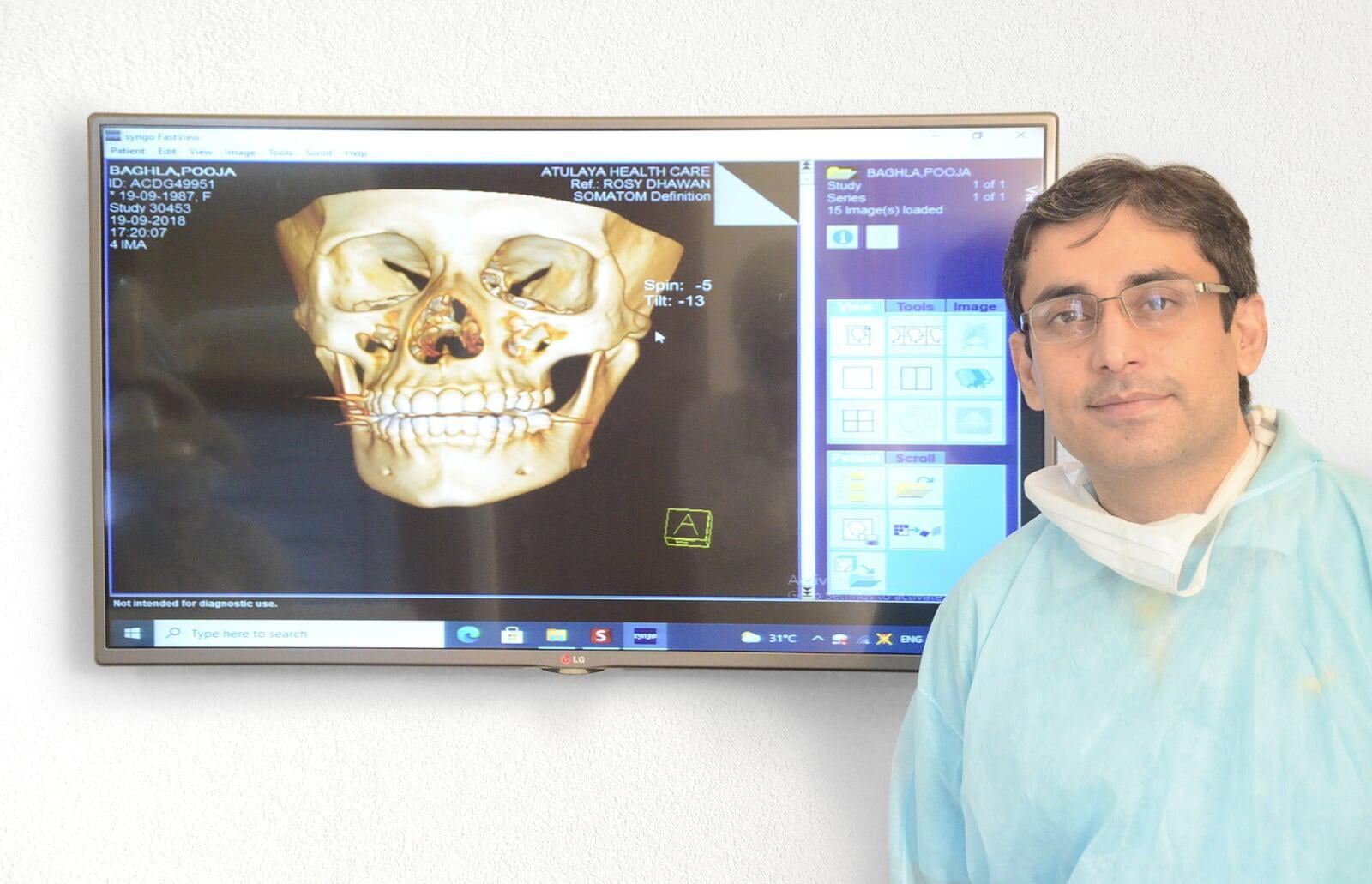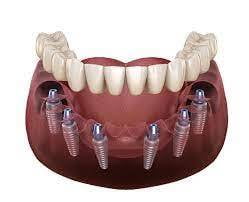Multiple Dental Implants: A Complete Treatment Guide for a Healthy Smile
 All-on-4 Implants
All-on-4 ImplantsMultiple Dental Implants: A Complete Treatment Guide for a Healthy Smile
Introduction
Tooth loss can significantly impact your oral health, confidence, and quality of life. Whether you’re missing multiple teeth due to decay, gum disease, or injury, dental implants offer a long-lasting and natural-looking solution.
But how do multiple implants work? What’s the treatment process, and how much do they cost? In this complete guide, we’ll explore everything you need to know about multiple dental implants and help you determine if they’re the right choice for you.
What Are Multiple Dental Implants?
Multiple dental implants involve placing two or more titanium implants into the jawbone to replace missing teeth. These implants serve as artificial tooth roots, supporting individual crowns, bridges, or full-arch prosthetics.
There are several ways multiple missing teeth can be restored using implants:- Implant-Supported Bridges – Ideal for replacing three or more missing teeth in a row.
- All-on-4 / All-on-6 Implants – Full-arch implant solutions for complete tooth loss.
- Individual Implants for Separate Teeth – Best when missing multiple non-adjacent teeth.
- Implant-Supported Dentures – Offer better stability than traditional removable dentures.
Who Is a Good Candidate for Multiple Dental Implants?
✅ Missing two or more teeth
✅ Have a healthy jawbone or can undergo bone grafting
✅ No active gum disease or infections
✅ Non-smoker or willing to quit before and after surgery
✅ Committed to good oral hygiene and regular dental visits
💡 If you have significant bone loss, smoke heavily, or have uncontrolled diabetes, you may need additional treatments or alternative tooth replacement options.
Step-by-Step Process of Getting Multiple Dental Implants
1. Initial Consultation & Treatment Planning
📌 Comprehensive dental exam (X-rays, CBCT scans, impressions)
📌 Discuss treatment options, cost, and timeline
📌 Evaluate jawbone health and need for bone grafting
2. Preparatory Procedures (If Needed)
✔ Tooth Extractions – If damaged teeth are still present
✔ Bone Grafting – If the jawbone is too thin or weak
✔ Sinus Lift – For upper implants if there’s insufficient bone height
💡 These procedures may add 3–6 months to the overall treatment time before implant placement.
3. Implant Surgery
✔ Titanium implants are surgically placed into the jawbone
✔ Healing period (osseointegration) begins – usually 3–6 months
✔ Temporary restorations may be placed for aesthetics and function
4. Abutment Placement
✔ Once healing is complete, a connector (abutment) is attached to the implant
✔ Additional healing for 2–4 weeks before final restorations
5. Final Restoration (Crown, Bridge, or Denture)
✔ A custom-made crown, bridge, or denture is securely attached to the implants
✔ Final adjustments are made for a comfortable and natural fit
Types of Multiple Dental Implants
1. Implant-Supported Bridge
 All-on-6 Dental Implants
All-on-6 Dental Implants✔ Fewer implants required (e.g., 2 implants can support 3–4 teeth)
✔ Cost-effective compared to individual implants
2. All-on-4 / All-on-6 Full-Arch Implants
✔ 4 or 6 implants support a full set of upper or lower teeth
✔ Fixed solution for full-mouth restoration
✔ Faster recovery & fewer implants than individual placements
3. Individual Dental Implants
✔ Each missing tooth is replaced with one implant and a crown
✔ Most natural-looking and durable option
✔ Ideal when missing teeth in different areas
4. Implant-Supported Dentures
✔ 2–6 implants stabilize a removable denture
✔ Prevents slipping and discomfort associated with traditional dentures
✔ More affordable than full-arch implant bridges
Benefits of Multiple Dental Implants
✅ Permanent & Durable – Can last 20+ years with proper care
✅ Natural Appearance & Functionality – Look and feel like real teeth
✅ Prevents Bone Loss – Stimulates jawbone to maintain facial structure
✅ Better Chewing Ability – Restores full eating function compared to dentures
✅ No Damage to Adjacent Teeth – Unlike bridges, implants don’t require modifying natural teeth
Potential Risks & Complications
⚠ Infection (Peri-Implantitis) – Can occur if oral hygiene is poor
⚠ Implant Failure – Rare, but possible due to bone loss or rejection
⚠ Nerve Damage – If placed too close to nerves
⚠ Sinus Problems – If upper implants protrude into sinus cavities
💡 Choosing an experienced implant dentist significantly reduces these risks.
How Much Do Multiple Dental Implants Cost?
The cost of multiple implants varies based on the number of implants, additional procedures, and location.
| Implant Type | Estimated Cost (Per Arch) |
|---|---|
| Single Implant + Crown | $3,000 – $5,000 |
| Implant-Supported Bridge (3 teeth) | $5,000 – $10,000 |
| All-on-4 Implants | $15,000 – $30,000 |
| All-on-6 Implants | $20,000 – $35,000 |
| Implant-Supported Dentures | $5,000 – $15,000 |
💰 Insurance may cover part of the cost, but most policies consider implants a cosmetic procedure. Financing options like CareCredit or in-house dental plans can help make the procedure more affordable.
Recovery & Aftercare Tips
1. Immediate Post-Surgery Care
✔ Rest and avoid strenuous activities for 24–48 hours
✔ Apply ice packs to reduce swelling
✔ Eat soft foods for the first week
2. Long-Term Care
✔ Brush and floss twice daily with a soft-bristle toothbrush
✔ Avoid smoking and excessive alcohol to prevent implant failure
✔ Visit your dentist every 6 months for check-ups
Are Multiple Dental Implants Worth It?
💯 YES, if you want a permanent, natural-looking, and highly functional solution for missing teeth. While the cost is higher than bridges or dentures, implants provide lifelong benefits with proper care.
🚫 NO, if you have severe bone loss, uncontrolled health issues, or a limited budget—in such cases, alternative treatments like implant-supported dentures or bridges may be more suitable.
Final Thoughts
Multiple dental implants offer a life-changing solution for people with missing teeth. Whether you need a few implants or a full-mouth restoration, this treatment provides unmatched durability, aesthetics, and functionality.
Related Articles
Dental Implant for Single Missing Tooth: Complete Treatment Guide
Dental Implants Dental Implant for Single Missing Tooth: Complete Treatment Guide Introduction Losing a single tooth can affect your smile, confidence, and overall oral health. Fortunately, dental implants provide a reliable and long-lasting ...Tooth Whitening Complete Treatment Guide
TOOTH WHITENING BEFORE & AFTER Introduction A bright, white smile is often associated with confidence and good oral health. Teeth whitening is a popular cosmetic dental treatment that helps remove stains and discoloration to achieve a brighter smile. ...Essential Home Care Tips for Maintaining Healthy Dental Implants
Essential Home Care Tips for Maintaining Healthy Dental Implants Introduction Dental implants have revolutionized the way we restore missing teeth, offering a permanent and natural-looking solution. However, like natural teeth, dental implants ...6 Stages of Dental Implant Treatment
6 Stages of Dental Implant Treatment: A Complete Guide to Successful Restoration Introduction Dental implants are a revolutionary solution for replacing missing teeth, offering durability, functionality, and a natural appearance. However, the journey ...Misaligned Teeth Treatment Guide
Misaligned Teeth Treatment Guide: Learn How Ceramic Braces Work? Introduction Misaligned teeth, also known as malocclusion, can affect both aesthetics and oral health. Crooked or crowded teeth may lead to difficulty chewing, speech problems, and an ...